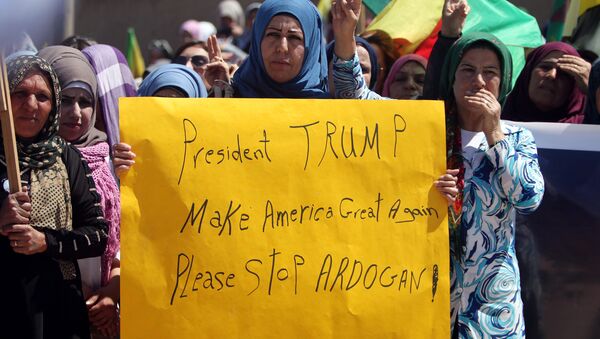Speaking to Radio Sputnik's Brian Becker, Shakdam underscored that while this conflict between Turkey and the Kurds — a war within a war — has been going on for quite a long time already, this is the first time that US troops have patrolled the Turkish-Kurdish border. The fractured relationship between Turkey and the US is what makes the latest news important.
Turkey is NATO's second largest military, Shakdam noted, and the US maintains that NATO is not involved in Syria. According to her, Turkey's behavior challenges US authority within the alliance — a sign of the alliance's weakening from within.
"The US was quite keen to play the Kurdish card because the US does not like a superpower — and Turkey is a superpower — without having some form of a counterbalance," Shakdam told Becker.
"The US does not want to give too much power to anybody."
To provide that counterbalance, the US trained Kurds under the pretext of fighting terrorism. That is why Kurds are now so effective in fighting terrorism in Syria, according to Shakdam.
"The US are really good at creating enemies wherever it needs to," she said, adding that Ankara is likely very aware of the US strategy.
"I would not be surprised," Shakdam says of this scenario, adding that the US has been trying to get into Syria since the beginning of the civil war back in 2011. According to Shakdam, the very "revolution" that happened in 2011 was "engineered to be violent."
The ultimate goal of the US in the region, she said, is to balkanize the Middle East, as that would make it easier for the US to control the region, playing factions against one another.
While Turkey is arguably the most powerful military in the Middle East, it's followed closely by Syria and Egypt. Both Egypt and Turkey understand that, should Syria fall, they will be "kind of next," according to Shakdam.
That being said, Turkey's interest — to rebuild its empire — directly contradicts that of the US.
Ankara has already made it clear that it is willing to go to great lengths to protect its neo-Ottoman dream against American efforts towards Balkanization.
Thus, ironically, one way to fight US influence would be for Turkey to withdraw from Syria, stopping its creeping intervention and returning to a policy of non-intervention. That would allow Assad to regain control and drive out Daesh faster, which would put the US in a very uncomfortable position, Shakdam speculates.
"It is still very possible," she said.






